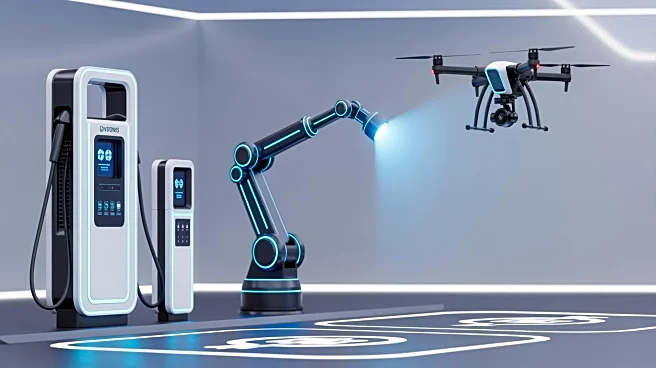What's Happening?
Rivian Automotive, Inc. has reported a robust third quarter with $1.56 billion in revenue, marking a 78% year-over-year increase. The company also achieved a positive consolidated gross profit of $24 million
for the first time. A significant contributor to this success was the software and services segment, which generated $416 million in revenue, largely due to the Rivian-Volkswagen technology venture. Additionally, Rivian announced the launch of Mind Robotics, a new industrial AI spinoff, backed by $110-115 million in external seed capital. This venture aims to explore opportunities in industrial AI systems, extending Rivian's expertise beyond automotive manufacturing.
Why It's Important?
Rivian's strong financial performance and strategic expansion into industrial AI highlight its potential to diversify revenue streams and enhance profitability. The success of the software segment suggests a growing importance of technology partnerships, such as the one with Volkswagen, in driving revenue. The Mind Robotics spinoff could position Rivian as a key player in the industrial AI market, potentially leading to new commercial contracts and further boosting software gross profit margins. This development is crucial for investors as it indicates Rivian's commitment to innovation and long-term growth beyond electric vehicles.
What's Next?
Rivian plans to continue scaling its software and services revenue, with a focus on sustaining the $400 million quarterly pace. The company is also preparing for the production of its R2 model in the first half of 2026, with a dedicated event planned for early 2026. Investors will be watching for updates on pilot milestones and supplier readiness. Additionally, Rivian's strategy to avoid extended-range hybrids and focus solely on battery-electric vehicles will be closely monitored as the company navigates the evolving EV market.
Beyond the Headlines
The launch of Mind Robotics reflects Rivian's strategic shift towards leveraging its operational data for industrial applications, potentially creating a 'robotics data flywheel' for factories and logistics. This move underscores the growing intersection of automotive and AI technologies, which could lead to significant advancements in manufacturing efficiency and cost reductions. Rivian's decision to focus on battery-electric vehicles aligns with broader industry trends towards sustainability and reduced emissions.










